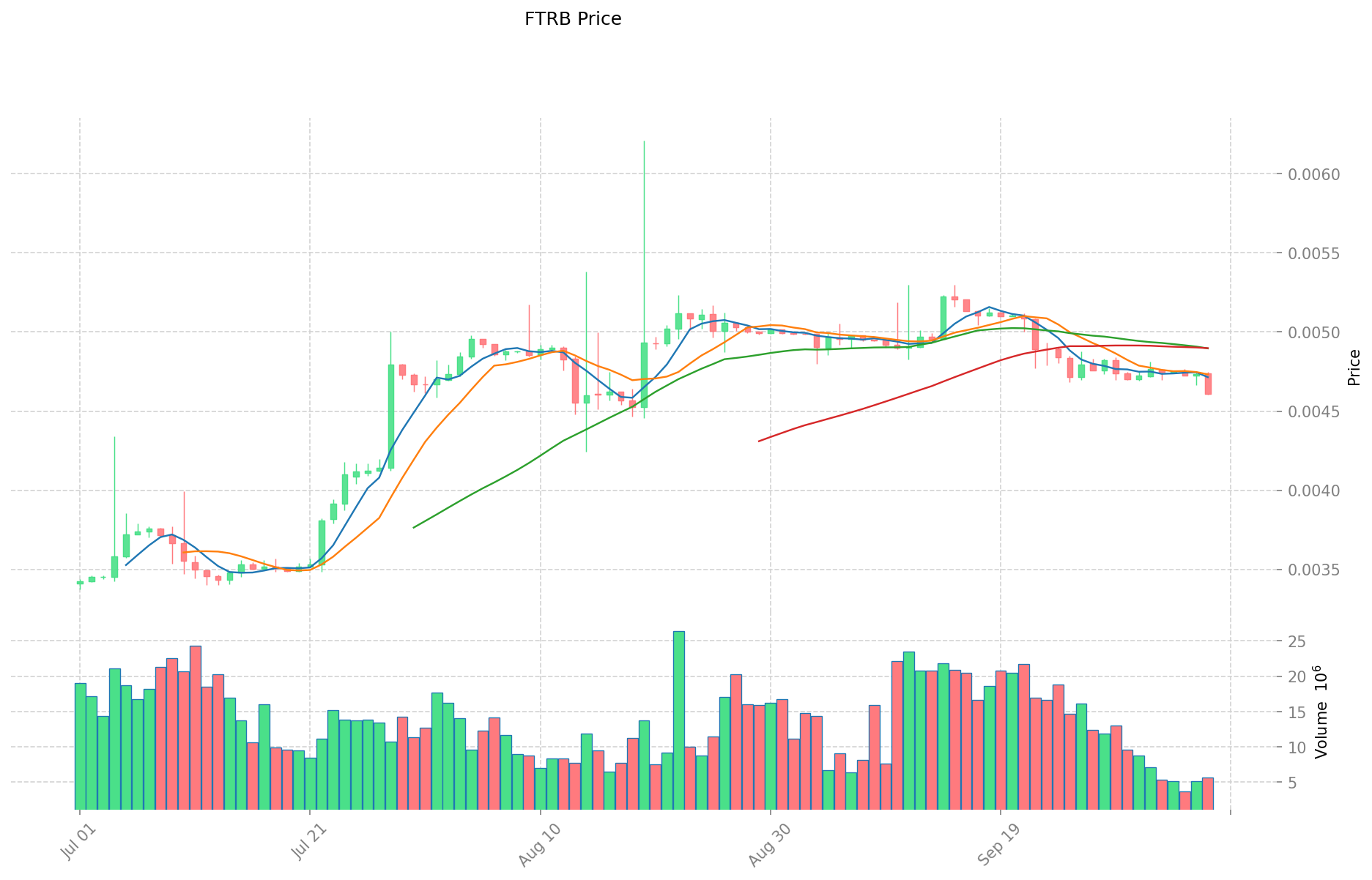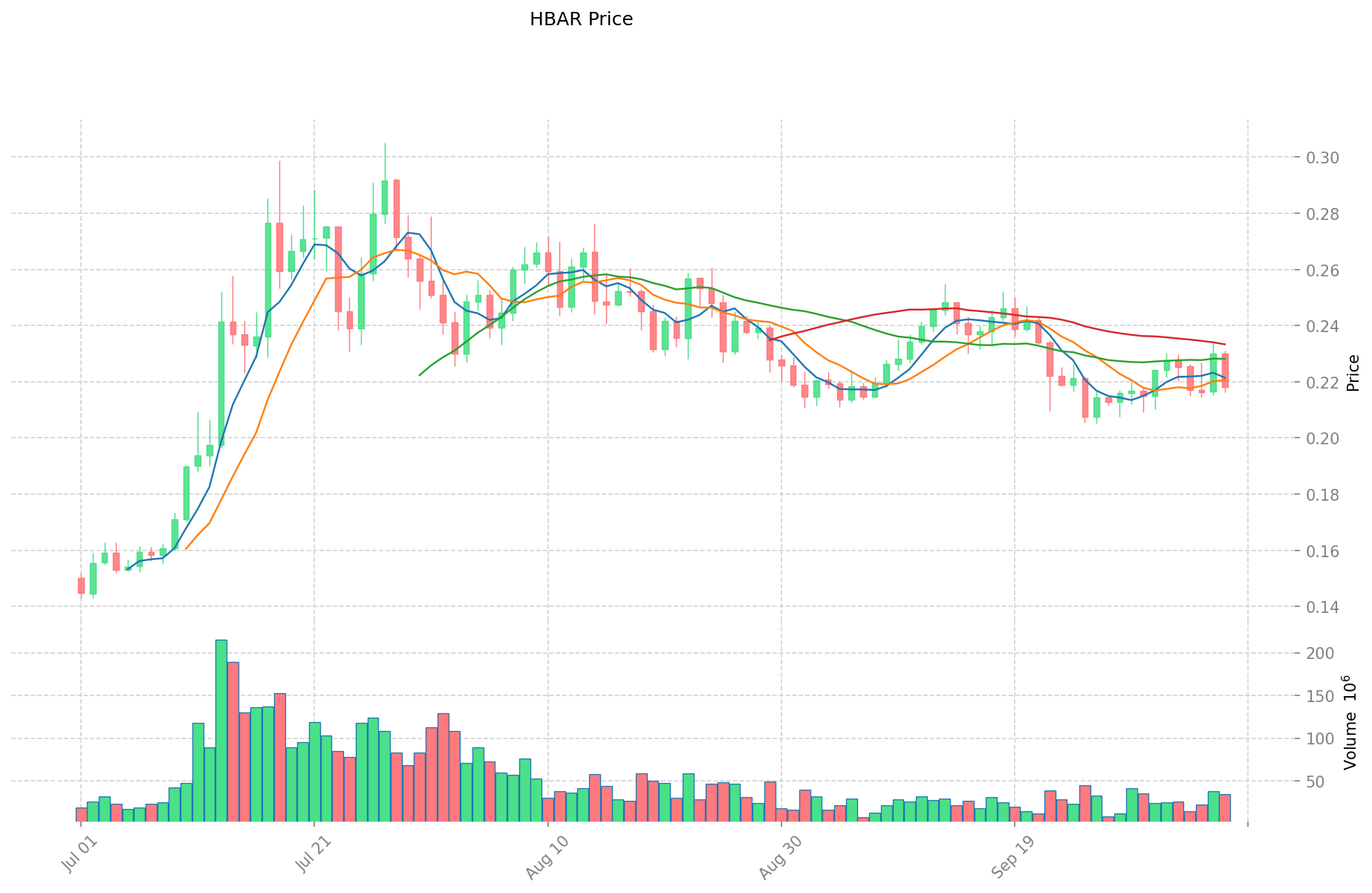FTRB ve HBAR: Kurumsal çözümler için önde gelen iki blockchain teknolojisinin karşılaştırılması

Giriş: FTRB ve HBAR Yatırımı Karşılaştırması
Kripto para piyasasında Faith Tribe (FTRB) ile Hedera (HBAR) arasındaki karşılaştırma, yatırımcıların göz ardı edemeyeceği bir konudur. FTRB ve HBAR; piyasa değeri sıralaması, kullanım alanları, fiyat performansı gibi temel başlıklarda ciddi farklar gösterirken, kripto varlıklar dünyasında farklı pozisyonları temsil etmektedir.
Faith Tribe (FTRB): 2022'de piyasaya sürülmüş ve Web3 ekonomisinde işbirliğine dayalı, açık kaynaklı moda tasarım platformu kimliğiyle piyasa tarafından kabul görmüştür.
Hedera (HBAR): 2019'dan bu yana hashgraph konsensüsünü kullanan hızlı, güvenli ve adil bir halka açık defter ağı olarak öne çıkmıştır; küresel çapta yüksek işlem hacmi ve piyasa değerine sahip kripto paralar arasında yer almaktadır.
Bu makale, FTRB ile HBAR'ın yatırım değerini; geçmiş fiyat trendleri, arz mekanizması, kurumsal benimseme, teknoloji ekosistemi ve gelecek öngörüleriyle kapsamlı şekilde analiz edecek, yatırımcıların en fazla merak ettiği soruya yanıt arayacaktır:
"Şu anda hangisi daha avantajlı bir yatırım?"
I. Fiyat Geçmişi Karşılaştırması ve Güncel Piyasa Durumu
FTRB (Coin A) ve HBAR (Coin B) Tarihsel Fiyat Eğilimleri
- 2022: FTRB, 0,07116 $ ile tüm zamanların en yüksek seviyesine ulaştı; ardından keskin bir düşüş yaşadı.
- 2021: HBAR, Eylül ayında artan benimseme ile 0,569229 $'a çıkarak zirveye ulaştı.
- Kıyaslama: Son piyasa döngüsünde FTRB, 0,07116 $ zirveden 0,00173617 $ dip seviyesine gerilerken; HBAR, fiyat seviyesini daha dirençli korudu.
Güncel Piyasa Durumu (08 Ekim 2025)
- FTRB güncel fiyatı: 0,004609 $
- HBAR güncel fiyatı: 0,21841 $
- 24 saatlik işlem hacmi: 26.598,82 $ (FTRB) / 7.659.525,49 $ (HBAR)
- Piyasa Duyarlılık Endeksi (Korku & Açgözlülük Endeksi): 70 (Açgözlülük)
Canlı fiyatları görüntülemek için tıklayın:
- FTRB güncel fiyatı için Piyasa Fiyatı
- HBAR güncel fiyatı için Piyasa Fiyatı


YATIRIM ANALİZİ: FTRB VE HBAR
I. FTRB ve HBAR Yatırım Değerini Belirleyen Temel Faktörler
Teknoloji Odağı ve Piyasa Uygulamaları
- FTRB: Robotik ve otomasyon alanındaki şirketleri takip ederek üretim inovasyonu ve yapay zekâ temelli verimlilik artışına erişim sunar
- HBAR: Hedera'nın dağıtık defter platformu ile blockchain teknolojisine odaklanır; kurumsal seviye güvenlik ve işlem hızını ön plana çıkarır
- 📌 Tarihsel eğilim: Her iki yatırımın değeri teknoloji inovasyon döngülerinden gelir; ancak sektörleri temelde farklıdır
Piyasa Performansı Dinamikleri
- FTRB, endüstriyel otomasyon trendlerinden ve kurumsal dijital dönüşümden faydalanır
- HBAR, Hedera ekosisteminin benimsenmesi ve ağın genişlemesiyle değer kazanır
- Korelasyon: FTRB, geleneksel teknoloji piyasalarına daha bağlı; HBAR ise kripto piyasası trendlerine daha yakındır
Risk Profili Değerlendirmesi
- FTRB: Çoklu şirketlere dağıtık, geleneksel yatırım aracı
- HBAR: Kripto varlıklara özgü yüksek oynaklık, daha fazla düzenleyici belirsizlik
- Piyasa bakışı: FTRB daha istikrarlı büyüme sunarken, HBAR yüksek risk-getiri fırsatları barındırır
II. FTRB ve HBAR Yatırım Değerini Etkileyen Temel Faktörler
Arz Mekanizmaları Karşılaştırması (Tokenomik)
- FTRB: ETF yapısı, arz piyasa talebi ve fon giriş-çıkışlarıyla belirlenir
- HBAR: Maksimum 50 milyar token arzı ve planlı dağıtım
- 📌 Tarihsel eğilim: Arz mekanizması, fiyat oynaklığı ve uzun vadeli değer korunmasında belirleyicidir
Kurumsal Benimseme ve Piyasa Uygulamaları
- Kurumsal portföyler: FTRB, geleneksel portföylerde ve emeklilik hesaplarında daha yaygın
- Kurumsal uygulama: HBAR; tedarik zinciri, kimlik yönetimi, finansal hizmetler gibi alanlarda yaygınlaşıyor
- Düzenleyici ortam: FTRB, yerleşik ETF regülasyonlarından faydalanırken; HBAR, değişen kripto düzenlemeleriyle karşı karşıya
Teknik Gelişim ve Ekosistem İnşası
- FTRB teknoloji avantajı: Robotik, otomasyon, yapay zekâ entegrasyonu ve üretim inovasyonundaki gelişmelerden fayda sağlar
- HBAR teknik gelişim: Konsensüs algoritmasında, akıllı sözleşmelerde ve kurumsal araçlarda sürekli iyileştirme
- Ekosistem karşılaştırması: FTRB şirketleri fiziksel ve dijital altyapı kurarken; HBAR, DeFi uygulamaları, tokenlaştırılmış varlıklar ve kurumsal çözümler geliştiriyor
Makroekonomik Faktörler ve Piyasa Döngüleri
- Enflasyon ortamı: FTRB, ılımlı enflasyonda öne çıkabilir; HBAR'ın sabit arz modeli yüksek enflasyonda cazip hale gelebilir
- Para politikası: Faiz oranları iki varlığı farklı biçimlerde etkiler
- Jeopolitik etki: Tedarik zinciri dayanıklılığı FTRB'ye avantaj sağlarken, sınır ötesi işlemler HBAR'ın benimsenmesini hızlandırabilir
III. 2025-2030 Fiyat Tahmini: FTRB ve HBAR
Kısa Vadeli Tahmin (2025)
- FTRB: Temkinli 0,00345825 $ - 0,004611 $ | İyimser 0,004611 $ - 0,00585597 $
- HBAR: Temkinli 0,17452 $ - 0,21815 $ | İyimser 0,21815 $ - 0,3250435 $
Orta Vadeli Tahmin (2027)
- FTRB, büyüme fazına geçebilir; fiyat tahminleri 0,00456543063975 $ - 0,0066292554495 $ aralığında
- HBAR, yükseliş piyasasına girebilir; fiyat tahminleri 0,184387033575 $ - 0,34498219185 $ aralığında
- Ana etkenler: Kurumsal sermaye girişi, ETF gelişmeleri, ekosistem büyümesi
Uzun Vadeli Tahmin (2030)
- FTRB: Temel senaryo 0,006643631802964 $ - 0,008004375666221 $ | İyimser senaryo 0,008004375666221 $ - 0,008244506936208 $
- HBAR: Temel senaryo 0,342210215328719 $ - 0,481986218772843 $ | İyimser senaryo 0,481986218772843 $ - 0,506085529711485 $
Yasal Uyarı: Bu analiz yalnızca bilgilendirme amaçlıdır, yatırım tavsiyesi değildir. Kripto para piyasalarında yüksek oynaklık ve öngörülemezlik söz konusudur. Yatırım kararı almadan önce mutlaka kendi araştırmanızı yapın.
FTRB:
| Yıl | Tahmini En Yüksek Fiyat | Tahmini Ortalama Fiyat | Tahmini En Düşük Fiyat | Değişim Oranı |
|---|---|---|---|---|
| 2025 | 0,00585597 | 0,004611 | 0,00345825 | 0 |
| 2026 | 0,00727454415 | 0,005233485 | 0,0043961274 | 13 |
| 2027 | 0,0066292554495 | 0,006254014575 | 0,00456543063975 | 35 |
| 2028 | 0,00824529281568 | 0,00644163501225 | 0,005733055160902 | 39 |
| 2029 | 0,008665287418478 | 0,007343463913965 | 0,006388813605149 | 59 |
| 2030 | 0,008244506936208 | 0,008004375666221 | 0,006643631802964 | 73 |
HBAR:
| Yıl | Tahmini En Yüksek Fiyat | Tahmini Ortalama Fiyat | Tahmini En Düşük Fiyat | Değişim Oranı |
|---|---|---|---|---|
| 2025 | 0,3250435 | 0,21815 | 0,17452 | 0 |
| 2026 | 0,3232001325 | 0,27159675 | 0,146662245 | 24 |
| 2027 | 0,34498219185 | 0,29739844125 | 0,184387033575 | 36 |
| 2028 | 0,4657259589975 | 0,32119031655 | 0,1638070614405 | 47 |
| 2029 | 0,570514299771937 | 0,39345813777375 | 0,259682370930675 | 80 |
| 2030 | 0,506085529711485 | 0,481986218772843 | 0,342210215328719 | 120 |
IV. Yatırım Stratejisi Karşılaştırması: FTRB ve HBAR
Uzun Vadeli ve Kısa Vadeli Yatırım Stratejileri
- FTRB: Endüstriyel otomasyon ve yapay zekâ temelli verimliliğe odaklanan yatırımcılar için uygundur
- HBAR: Kurumsal blockchain benimsemesi ve dağıtık defter teknolojisine ilgi duyan yatırımcılar için uygundur
Risk Yönetimi ve Varlık Dağılımı
- Temkinli yatırımcılar: FTRB %70, HBAR %30
- Agresif yatırımcılar: FTRB %40, HBAR %60
- Koruma araçları: Stablecoin tahsisi, opsiyonlar, çapraz para portföyleri
V. Potansiyel Risk Karşılaştırması
Piyasa Riskleri
- FTRB: Ekonomik döngülere ve teknoloji inovasyon hızına duyarlı
- HBAR: Kripto piyasalarına özgü yüksek oynaklık
Teknik Riskler
- FTRB: İlgili şirketlerin ölçeklenebilirliği, portföy dengeleme verimliliği
- HBAR: Ağ istikrarı, olası güvenlik açıkları
Düzenleyici Riskler
- Küresel düzenleyici politikalar, kripto para regülasyonları nedeniyle HBAR üzerinde daha etkili olabilir
VI. Sonuç: Hangisi Daha Avantajlı?
📌 Yatırım Değeri Özeti:
- FTRB avantajları: Robotik ve otomasyon sektörlerine erişim, daha istikrarlı büyüme potansiyeli
- HBAR avantajları: Yüksek işlem hızı, kurumsal seviye güvenlik, farklı sektörlerde güçlü benimseme potansiyeli
✅ Yatırım Tavsiyesi:
- Yeni yatırımcılar: Düşük oynaklığı nedeniyle FTRB'yi daha yüksek oranda değerlendirebilir
- Deneyimli yatırımcılar: Risk toleransına göre FTRB ve HBAR'ı dengeleyerek portföy oluşturabilir
- Kurumsal yatırımcılar: Geleneksel portföyler için FTRB, blockchain teknolojisi maruziyeti için HBAR tercih edilebilir
⚠️ Risk Uyarısı: Kripto para piyasalarında yüksek oynaklık riski mevcuttur. Bu makale yatırım tavsiyesi değildir. None
VII. Sıkça Sorulan Sorular
S1: FTRB ile HBAR arasındaki temel farklar nedir? C: FTRB, robotik ve otomasyon sektörlerindeki şirketleri izler; HBAR ise Hedera'nın dağıtık defter platformu ile blockchain teknolojisine odaklanır. FTRB, geleneksel teknoloji piyasalarına daha bağlıyken, HBAR kripto piyasası trendlerine tabidir.
S2: Geçmiş fiyat performansında hangi yatırım daha dirençli oldu? C: Verilere göre, HBAR piyasa döngülerinde fiyat seviyesini daha iyi koruyarak daha dirençli performans sergilemiştir. HBAR, Eylül 2021'de 0,569229 $ ile zirveye ulaşırken, FTRB'nin zirvesi 2022'de 0,07116 $ idi.
S3: FTRB ile HBAR'ın arz mekanizması nasıl farklılaşıyor? C: FTRB, ETF yapısında arzı piyasa talebi ve fon akışlarıyla belirlerken; HBAR'ın arzı 50 milyar token ile sabittir ve planlı dağıtım süreci vardır.
S4: FTRB ve HBAR'ın yatırım değerini etkileyen en önemli faktörler hangileridir? C: Temel faktörler; teknoloji odağı, piyasa uygulamaları, arz mekanizması, kurumsal benimseme, teknik gelişim, ekosistem inşası ve enflasyon ile para politikası gibi makroekonomik unsurlardır.
S5: FTRB ve HBAR'ın risk profili nasıl karşılaştırılır? C: FTRB, çoklu şirketlere dağıtık, geleneksel yatırım aracı olup daha istikrarlı büyüme sunar. HBAR ise kripto varlıklara özgü yüksek oynaklık ve daha fazla düzenleyici belirsizlikle daha yüksek risk-getiri imkânı yaratır.
S6: 2030 için FTRB ve HBAR'ın uzun vadeli fiyat tahminleri nedir? C: FTRB için temel senaryo 0,006643631802964 $ - 0,008004375666221 $, iyimser senaryo ise 0,008004375666221 $ - 0,008244506936208 $ aralığındadır. HBAR için temel senaryo 0,342210215328719 $ - 0,481986218772843 $, iyimser senaryo ise 0,481986218772843 $ - 0,506085529711485 $ aralığındadır.
S7: Yatırımcılar FTRB ve HBAR arasında varlık dağılımını nasıl yapmalı? C: Temkinli yatırımcılar portföylerinde %70 FTRB, %30 HBAR; agresif yatırımcılar ise %40 FTRB, %60 HBAR tercih edebilir. Nihai dağılım bireysel risk toleransı ve yatırım hedeflerine göre değişmelidir.
S8: FTRB ve HBAR için potansiyel düzenleyici riskler nelerdir? C: HBAR, kripto para regülasyonlarından kaynaklı daha yüksek düzenleyici risklerle karşılaşabilir. FTRB ise yerleşik ETF regülasyonları sayesinde daha fazla istikrar sunar.

Litecoin'ın Temel Göstergeleri, 2027 Yılına Kadar LTC Fiyatını Nasıl Etkileyecek?

HBAR’ın balina hareketleri, piyasa değeri ve fiyatı üzerinde nasıl bir etki yaratır?

HBAR, performans ve pazar payı bakımından Solana, Cardano ve Ethereum ile nasıl kıyaslanıyor?

2025 yılında AVAX'ın karşı karşıya olduğu temel uyum ve düzenleyici riskler nelerdir?

İlk SUI ETF'si onaylandı: 2x kaldıraçlı TXXS, Kripto Varlıklar yatırımcıları için ne anlama geliyor?

Litecoin'ın elde tutulma oranı ve fon akışı, 2025 yılında diğer kripto paralar ile nasıl karşılaştırılıyor?

Dropee Günlük Kombinasyonu 11 Aralık 2025

Tomarket Günlük Kombinasyonu 11 Aralık 2025

Merkeziyetsiz Finans'ta Geçici Kayıp Nedir?

Kripto Parada Çifte Harcama: Önleme Stratejileri

Kripto Ticaretinde Wyckoff Yönteminin Anlaşılması





